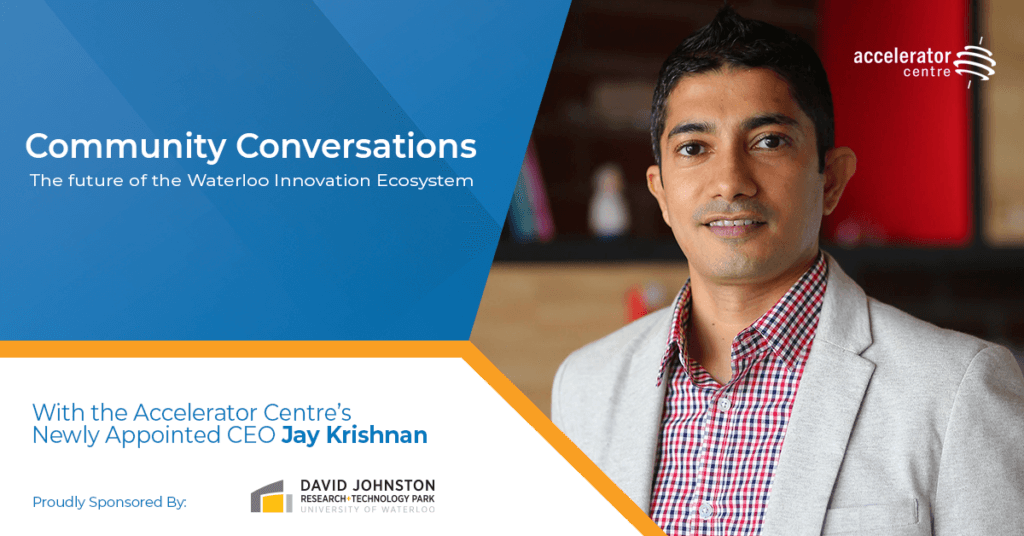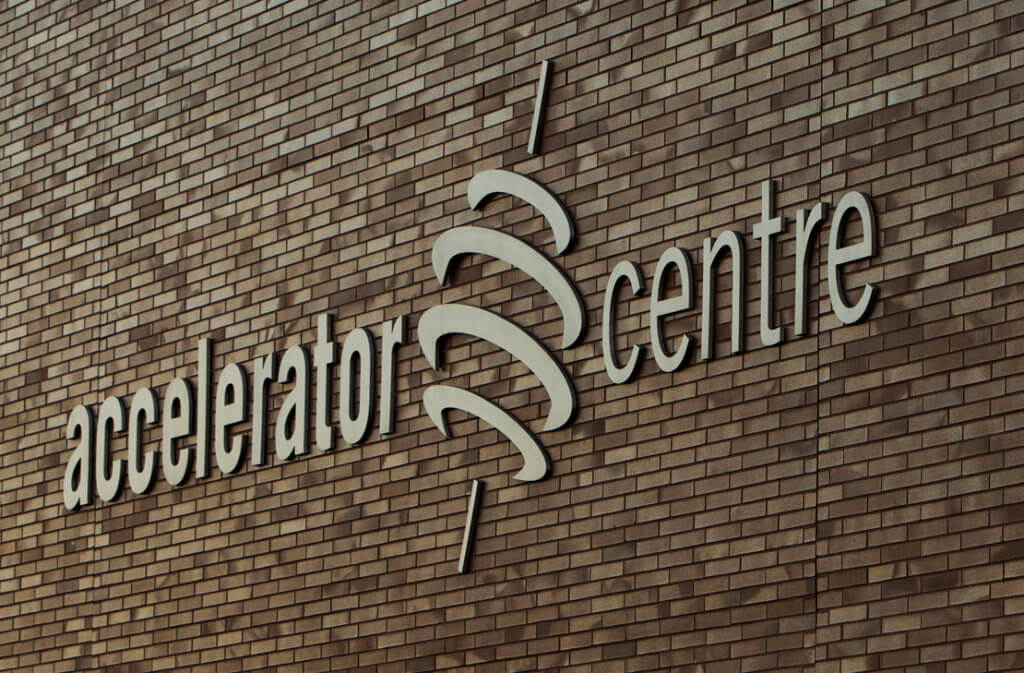Strengthening Waterloo’s Innovation Corridor
MEDI students craft bold visions for a vibrant David Johnston Research + Technology Park This story was originally published on…

Waterloo Region’s tech ecosystem mirrors the community’s spirit of barn raising. Need help with an errant API issue? There’s someone at a neighbouring company who can help. Has your company just launched something new on Product Hunt? There’s an army of people happy to upvote that for you.
You can see that community first-hand in the local KW Tech Slack Team. Whether you’re a longtime resident or new to town, the group is there to help with everything from recommendations on mechanics to sharing job postings and interviewing tips. For those new to town, it’s the place to pop in and introduce yourself.
Usually, it’s someone moving from Toronto or Montreal looking to make connections. Last week, it was a guy moving from Hyderabad to Waterloo. His name is Jay Krishnan, and his new gig happens to be the CEO of the Accelerator Centre, located in the David Johnston Research + Technology Park.
We caught up with Jay over a video call to learn more about his path to Waterloo, why he thinks our ecosystem is poised for a significant jump, and how he manages his new role while working remotely.
Thanks for making time to speak with us. We’re interested in how you found out about the Accelerator Centre and what made you apply for the CEO role.
Quite like the rest of the seven billion of us, I wanted to recalibrate where I was in terms of life and my profession. I’ve dabbled in the ecosystem space and in the entrepreneurial space running my own startups and in the VC space. I figured two things – first, I want to get into an operating role. That’s really what I like to do. Second, I looked at geographies where the next big problems of the world, where large infrastructural stuff gets solved. That’s supply-driven. In the last two, three years, maybe even a decade, everything’s been demand-driven. A dog sitting app marketplace gets to be valued at a billion, and then you have phenomenal stuff that gets built that solves climate change which gets valued for a few hundred thousand. So I wanted to focus on supply-driven instead of demand-driven. I started zoning in on countries that provide that, and Canada checks all the boxes on the supply side and the tech innovation side. So because of all that, I figured, okay, my next big move has got to be Canada. I saw the opening at the Accelerator Centre, did some research, and I said I would love for an opportunity to interview here. So I reached out and asked.
During your research about Canada and Waterloo Region, what really struck a chord with you?
The obvious ones are the ones that everybody talks about – great talent, great tech, academia, access to large markets. Apart from all that, the things that I’ve really loved about ecosystems that have taken four or five decades to evolve – the Valley is one of them – have really been three things; momentum, diversity, and density. The larger the intersect of those three things, the better off one is.
DON’T MISS: The Future of Waterloo’s Innovation Ecosystem with AC CEO Jay Krishnan
Being co-located in the R+T Park gives Accelerator Centre clients access to cutting-edge research, new grads, and one of the world’s best co-op programs at the University of Waterloo. How do you see the University and the Accelerator Centre continuing to grow?
That’s a great question. I think, to begin with, having a tight coupling with academia that has deep roots in science and technology, innovation and engineering is paramount. All we need to do is look at history and go back to the Valley again, and it’s really the birth of the extension of radar from Stanford Labs that made that happen. I think you’re sitting on a fantastic opportunity with the R+T Park and the University of Waterloo.
Canadian startups typically focus on launching in the US and Canada first. With your experience from T-Hub, what are your thoughts on customer discovery and determining your product-market fit and focusing outside of those regions?
If you look at social commerce, be it new forms of revenue on Facebook or Amazon. A lot of these giant companies have made this insanely huge bet on India. The extent that business has gone and said publicly, that this is a market that we will just not lose no matter what. I think that’s a powerful statement. If we can leapfrog that and say, well, let’s just go there, let’s just go figure it out. We’ll take a while. But it’s a market that’s ripe for accepting brand new products. I feel that you haven’t scratched the surface in terms of products coming out of Canada – and specifically Waterloo – that can potentially be in the hands of the Indian consumer or enterprise class products looking to solve challenges in India.
Switching gears a little, we’re talking over video chat, something that is now common for most companies as we’ve moved to work from home. But there are a lot of businesses in the US and Canada who have said they’re going to go remote by default. With the Accelerator Centre being a space where collisions happen between people and ideas get shared, how important is the physical space to you?
I personally believe that the reason why the human race is the size it is is because of our ability to build communities. During COVID-19, the one thing that really stood out is that people really help each other worldwide. At the end of the day, we will help each other. I think that the underlying element of the desire to build social capital will never go away. I think there will be a low when it comes to going back into buildings, probably for the next 12 months. But I think people will eventually throng back to circles and offline meetings where this interaction that we’re having is actually over coffee in-person.
Okay, last question. You’ll definitely have lived the remote work to return to the office journey as you started your new role remotely from India. What do you see as being the first things you do once you have shoes on the ground here?
The remote part doesn’t really affect me, given that we’re all doing it anyway. I’m doing what I would have done had I been there physically. Spend the first 30 days talking to the team, the stakeholders, partners, and build on the strengths that we have as an organization. Clearly, there’s a lot of that, which is great. Working remotely really doesn’t change much. Because all these interviews, minus the coffee or the beer, we can still do it over Zoom.
